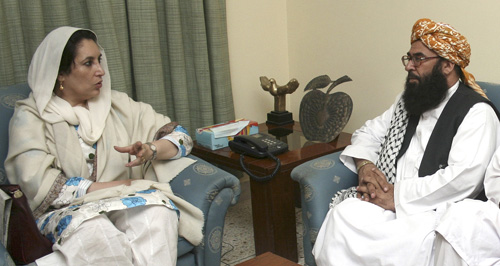Ex-leader of Pakistan receives death threat

Benazir Bhutto, left, meets opposition leader Ghafoor Haidari on Tuesday in Karachi, Pakistan. Erica Magda
October 24, 2007
KARACHI, Pakistan – Former Prime Minister Benazir Bhutto said Tuesday she had received a new death threat but will start campaigning in Pakistani cities in the next couple days, avoiding mass rallies.
Five days after the suicide bombing that killed at least 136 at her homecoming procession in Karachi, Bhutto said her lawyer received a letter from an unidentified “friend of al-Qaida” threatening to slaughter her “like a goat.”
Bhutto said the letter was addressed to her lawyer, Farooq Naik, and had been left for him at the Supreme Court in Islamabad. She said Naik was alerting the chief justice of the threat.
“There are elements who want who to kill us,” Bhutto said at her heavily guarded residence in this southern city. “They are petrified that the Pakistan People’s Party will return (to power) and that democracy will return.”
“They are trying to derail the democratic process because they know if the people are employed and educated the forces of extremism and terrorism will be weakened,” she said.
Get The Daily Illini in your inbox!
The authenticity of the letter could not be confirmed. Bhutto said the writer claimed to be the “head of the suicide bombers and a friend of al-Qaida and Osama bin Laden.”
Bhutto returned Thursday from eight years in exile to campaign for parliamentary elections due in January, after months of talks with President Gen. Pervez Musharraf that could see them working side-by-side in the next government.
She said that after discussions, her party had decided she should avoid staging mass rallies because of the risk of suicide and roadside bombings, but would still address public meetings.
“The party decided I should go from Karachi to Islamabad, Lahore or Larkana (Bhutto’s hometown) in the next couple of days. We will not be holding public rallies but will be traveling to meet the people in other provinces,” she said.
Bhutto has blamed alleged extremist elements in the government and the security apparatus for the bombing that ripped through Thursday’s rally in Karachi – claims the government denies.
She alleges they include remnants of the regime of former military leader Gen. Zia-ul Haq, who oversaw mujahedeen groups that fought the Soviet occupation of Afghanistan in the 1980s, then became Taliban and al-Qaida. She alleges some members of the ruling party, including its chief, were behind Thursday’s attack.
That has raised questions about how the parties could form a coalition in support of Musharraf after the elections. Although Bhutto and Musharraf are rivals, both are moderates keen to combat religious extremism.






